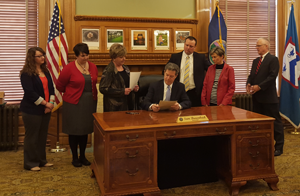The vast majority of Kansans who gamble do so responsibly. But for the segment of gamblers who succumb to disordered gambling behavior the consequences can be devastating in terms of financial consequences, harm to relationships, job loss, mood disorders and even suicidal thoughts.
Making matters worse, there is evidence of strong correlations between problem gambling and other behavioral and mental health disorders including substance abuse disorders and other psychological illnesses.
When the Kansas Legislature enacted legislation authorizing state-owned casinos, the Problem Gambling and Other Addictions Grant Fund was created to provide treatment, communications services, community support, and public awareness programs to mitigate the harmful consequences experienced by problem gamblers and their families.
The breadth of services is comprehensive but conveniently accessed through a single Problem Gambling Helpline where trained professionals are available 24 hours a day, 7 days a week.
1-800-522-4700 will connect problem gamblers, friends, and families to information about the warning signs and symptoms of a problem gambling disorder and the options available to individuals and their families.
- Referral to certified problem gambling treatment counsellors located throughout Kansas
- Information about state-funded reimbursement for treatment which is available at no cost to problem gamblers, family members and others affected by the problem. The State of Kansas will supplement insurance co-pays, deductible, or the entire cost for uninsured families including associated transportation costs for up to 12 counselling session for anyone diagnosed with a gambling addiction. Treatment beyond those 12 sessions is available if a mental health professionals considers it necessary.
- Contact information for Gamblers Anonymous and Gam-Anon.
- Information and referral to the Voluntary Exclusion program that gives Problem Gamblers the option of self-exclusion from entering any of the state-owned casinos in Kansas. In addition they will be prohibited from cashing checks or using credit cards and will be removed from casino mailing lists.
According to Kansas Coalition For Problem Gambling president Joyce Markham many gambling addicts report substantial financial losses. “The problem gambler may feel the only way to quickly get back that money is to gamble more and more, desperately chasing their losses. This can lead to a downward spiral of increasingly negative consequences. The longer you gamble, the more likely you are to lose,” according to Marham.
Data collected at the commencement of problem gambling treatment indicates over 80% of those with the disorder have outstanding gambling debt and nearly as many relied on others for money. About 30% engage in illegal acts to cover their outstanding debt or filed for bankruptcy. Not surprisingly the majority of problem gamblers suffer trouble with personal relationships.
With expansion of state-owned casinos planned for Southeast Kansas and increasing availability of internet gaming, Kansans’ access to gambling will continue to grow. But so is the availability of services and programs Kansans have to mitigate the associated risks and potentially negative consequences that can arise when gambling becomes problematic.



 RSS Feed
RSS Feed